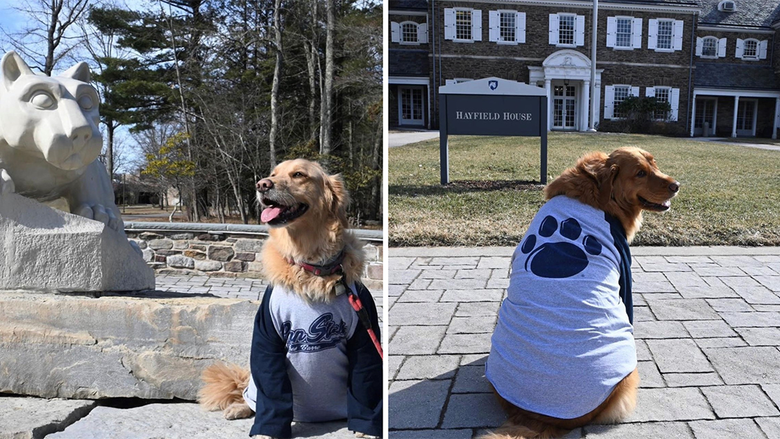

This dialog contains the full navigation menu for this site.

Criminal justice has evolved to be far more than sentencing and punishment that slams the door shut on a prison cell. Instead, a philosophy known as restorative justice focuses on growth and recovery, serving justice while rebuilding relationships.
“We want to help students understand that people’s actions impact other people and to help them understand the interconnection of other people’s actions in society,” said Assistant Professor of Administration of Justice Jeremy Olson, who serves as interim program coordinator. “We also want to help them understand more innovative ways to reduce crime. This focus is more about repairing harm and building relationships so future crime is averted or deterred.”
With a focus on restorative justice interspersed throughout its curriculum, Penn State Wilkes-Barre’s administration of justice program is taking a unique approach in training its students to learn more about restorative philosophies and practices. Restorative practices are used in any situation where people can cause harm or where harm has already been done – including emotional, physical, or mental harm. Restorative practices are designed for all parties involved to heal properly and strengthen their future relationships.
“Restorative justice has a focus on resolving harms and building relationships, and students in our program work on developing a program to work in the real world,” Olson said. “Our focus allows Penn State Wilkes-Barre students to graduate with a practiced and refined set of ‘soft’ skills that research shows employers want and that sets people up for success in graduate study: problem-solving, critical thinking, interpersonal communication, teamwork, and leadership.”
Restorative practices are used in criminal justice, juvenile justice, adult court, family court, civil court, contract court, medical malpractice, and school systems, to name a few. They are also used by the Equal Employment Opportunity Commission in cases of workplace complaints. Penn State Wilkes-Barre’s program is designed to train students to consider the application of justice from every angle, including the viewpoints of offenders, victims, lawyers, and law enforcement officials.
Olson is leading a team of interdisciplinary faculty and students at Penn State Wilkes-Barre in restorative justice efforts, including research and projects aimed at building educational, human services, and law enforcement collaborations in Luzerne and Wyoming counties. Collaboration is a major focus of the initiative.
“The whole system is collaborative,” Olson said. “We have what is referred to as the four C’s: cops, courts, corrections, and citizens. All of them impact each other and are interconnected.”
He said restorative justice aligns closely with social justice and has caught the interest of students in a variety of majors who want to make sure that perpetrators, victims, witnesses, and others in the system are treated in a way that is merciful, just, humane, and equitable.
“We’re looking for students who want to go out and make the world a better place,” he said. “Through taking classes with this approach, students gain an understanding of how their jobs can interrelate to help keep society safe. We all have a part in crime reduction.”
Graduates of the program work in many different roles in the criminal justice system, including those of victim advocate; agents of the Bureau of Alcohol, Tobacco, Firearms and Explosives, Drug Enforcement Administration, Federal Bureau of Investigation, Customs and Border Protection, U.S. Marshal’s Office, U.S. Department of Homeland Security, and Secret Service; state police officer; county sheriff; police officer; corrections officer; juvenile officer; case manager; and private investigator.
Penn State Wilkes-Barre offers administration of justice as one of its nine majors and as a minor as well. Students can choose to pursue a bachelor of arts or bachelor of science program in administration of justice, depending on what track they want to take. The minor is also beneficial for students who choose a major in a related field. Students in other majors often work with offenders, victims, or their families and will have a greater understanding of how the justice system works by taking courses in administration of justice.
Melisa Littleton, lecturer in rehabilitation and human services (RHS) and program coordinator of RHS at Penn State Wilkes-Barre, said the interdisciplinary nature of the program lends itself to a more comprehensive understanding of major issues in criminal justice.
“The overlap with mental health is so prevalent when we look at the prison population and people who are committing crimes,” Littleton said. “More often than not, you’ll find something in their history that qualifies them for mental health treatment. They are often committing offenses as a result of trauma they haven’t gotten treatment for or been able to work through, and a lot of times that is expressed through criminal behavior.”
She said that for many offenders, going through therapy and understanding themselves and the reasons why they became perpetrators can help them take responsibility for their actions.
“When we understand ourselves a little more, most often because we have something bothering us, we can behave in ways to try to fix that,” she said.
Littleton said students in administration of justice benefit from taking classes in rehabilitation and human services, learning to be more understanding and patient, and learning how to understand people with disabilities.
“Students learn about mental health and stigmas, in addition to crisis management and how to treat offenders with dignity and respect,” she said. “We work to dispel myths about this population and help students learn about providing appropriate care while understanding where they’re coming from and why they’re dealing with these issues.”
Olson said, “Everything interconnects, and that’s a theme we talk about with our students. Societies, people, and jobs all interconnect. We want to help students make these connections, giving them perspectives and tools to understand how it works.”
Under Olson’s leadership, Penn State Wilkes-Barre is making connections with community organizations for mutually beneficial partnerships. Last semester, the campus hosted a restorative justice panel, bringing community drug and alcohol agencies, the district attorney’s office, and other groups together to present information to the community on how restorative justice can be used to combat the opioid crisis and reduce harm in local communities.
Littleton said that in addition to the benefits for the community, the panel helped her students learn more about their career options.
“Sometimes students know they want to be a helping professional but they aren’t really sure in what capacity,” she said. “The members of the panel helped students realize what potential professions were out there. It was a good way to show there are different positions all working together toward the same goal.”
Olson is continuing to reach out to the community to learn about how Penn State Wilkes-Barre can assist with restorative justice programs for their students or clients.
“Our main goal is for students not just to touch a book, but touch the world at the same time,” he said. “We want them to ask, ‘How can we help schools, courts, and the community improve their communities with what we’re learning?’ We are looking to help communities reach their goals and improve their citizens’ lives, not just after our students graduate but while they are still sitting in our classrooms.”
Additionally, Olson and Littleton are taking a team of students to an international conference in San Antonio in March for the students to present their research projects on restorative justice.
“The students are excited to go and present their research,” Littleton said. “They see themselves as helping professionals working in criminal justice and the conference gives them the opportunity to blend the two.”
To learn more about the administration of justice program and how students are gaining real-world experience while earning their degrees at Penn State Wilkes-Barre, contact Olson at 570-675-9255 or [email protected]. Those interested in learning more about educational, human services, and law enforcement collaborations in Luzerne and Wyoming counties can also contact Olson.

